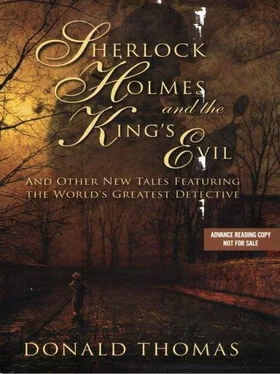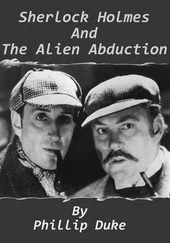Holmes himself was supreme-and he knew it. After the Zimmermann adventure was over and the war had ended, I recall him reclining in his fireside chair during one of his more insufferable meditations, shaking out the match with which he had just lit his briar pipe and saying,
“All things considered, Watson, and though I found much of the work tiresome, I believe it was just as well that I was at hand when this little matter came to the attention of our government.”
He did not intend to be humorous in the least. All the same I laughed. It was too much like the Duke of Wellington recalling the “close-run thing” of the Battle of Waterloo and adding, “Damn it, I do not know that it would have done if I had not been there.”
It would not have done-in either case. Let me now reveal how the career of Sherlock Holmes in the Great War of 1914-18 culminated in that bizarre but momentous battle of the famous telegram.
Holmes and I were recruited to this work on the very eve of war. The man responsible was the First Sea Lord at the Admiralty, Sir John Fisher, with whom my friend had worked in breaking Germany ’s peacetime codes. “Jacky Fisher,” as he was popularly known, did nothing so obvious as visiting us in Baker Street. Who was to say whether a passer-by might not be a trained spy, or a German sympathiser in the pay of Tirpitz and his Kriegsmarine?
We knew from our friend Chief Inspector Lestrade, now of the Special Branch at Scotland Yard, that several neutrals in the Baker Street area were under suspicion. They included a Swiss watch-repairer, a Swedish bank courier, even a Spanish restaurateur. Any of these might be the man whose role in the war was to report to Germany on the movements and activities of such men as Sherlock Holmes. Being neutrals, they might inform military intelligence in Berlin, through German embassies in their own countries, without the danger of being hanged or shot in London as traitors.
To foil surveillance of this kind, Sir John Fisher arranged a most unlikely rendezvous with Sherlock Holmes. It was the last Court Ball to be held at Buckingham Palace, before all such good things ended for the duration of the war. The place was well chosen, precisely because it was the type of function which Holmes abominated. So little taste had my friend for what he dismissed as “flummery” that there was an inevitable difficulty as to which ladies we should escort to the occasion. In the end, I was obliged to call upon the services of two astonished spinster cousins from Devonshire.
The Court Ball itself-dancing on the path to Armageddon as Holmes called it grimly-was no less brilliant for being the last of its kind. It was to have been held a month earlier, before the ultimatums of war were issued. Instead, it had been postponed during a period of court mourning for the assassination in Sarajevo of the Archduke Ferdinand of Austria and his wife Sophie by a Bosnian student on 28 June. Who would have thought that two deaths in a remote and dusty Balkan town would plunge the entire world into such conflict?
Even as a century of peace was dying, the scene at the palace on that gala night was one I shall never forget. The young Prince of Wales, a shy boy who was to succeed his father as Edward VIII in 1936, was his mother’s partner and piloted Queen Mary through the Royal Quadrille. King George stood apart, in grave conversation with the Ambassador of our Russian ally, Count Benckendorff. The Germans and the Austrians had feigned a diplomatic absence and were packing their bags for the journey home, as the minutes of our ultimatum ticked away.
At the edge of the grand ballroom, Holmes and I found ourselves chatting in a small group round Lord William Cecil, the King’s Equerry, who was also an officer of Military Intelligence at the War Office. Holmes had no appetite for small talk of any kind. He soon lapsed into a gloomy and discourteous silence. Even when a reply was necessary, he responded by a monosyllable.
I was only too anxious to be rescued from this embarrassment. I looked across the floor towards the tall and elegant figure of Sir John Fisher, in formal royal blue uniform and gold piping of Admiral of the Fleet. He caught my eye but gave no sign of recognition. He too was now unsmiling, despite the “laughter lines” round his mouth. Even the brightness in his pale eyes had died away.
Holmes and Jacky Fisher had been firm friends for many years. Fisher was a man after Holmes’s heart with his simple policy for naval warfare. “Hit first, hit hard, and keep on hitting.” Sherlock Holmes would never hear a word spoken against the admiral, describing Fisher as having “not an inch of pose about him.” My friend gave him the motto, “Sworn to no party-of no sect am I. I can’t be silent and I will not lie.”
Just then, Lord William Cecil ceased to talk ballroom trivialities. As if he had received a signal, he took us each by an elbow, murmuring something about “supper.” He led us towards the grand buffet, where a crowd was beginning to gather. However, we were not to reach those supper tables with their sparkling white cloths, their silver and porcelain dishes of salmon and caviar, where royal footmen were waiting to serve us. To one side of this display was a white panelled door with gilt mouldings. Beyond it lay an ante-room. In a moment we had passed through and the door had been locked behind us. The exchanges which followed were to remain under our wartime oath of secrecy.
Sir John Fisher was there to speak for King George. Lord William Cecil held a brief for the General Staff. There was one other man who was a complete stranger to me. Yet if I had never met him again I should not have forgotten his appearance. He was wearing the uniform of a Royal Navy captain. I recall him as being dapper, alert, with a perfectly-domed bald head, a large hooked nose and a strong cleft chin. Most memorably, he had eyes that were possessed of a dark and penetrating hypnotic power.
As we entered the damask-panelled chamber, Fisher went up to this newcomer and then turned to us.
“Gentlemen, may I present to you Captain Reginald Hall, who is at present commander of the battle-cruiser Queen Mary? You will see and hear a good deal of him before long. He will very shortly be taking up his appointment among us as Admiral Sir Reginald Hall, Director of Admiralty Intelligence.”
After that, I needed no further hints to deduce what part Holmes and I were invited to play. When the formal introductions were over. Reginald Hall casually picked up a copy of that evening’s Globe newspaper, which had been left on a small occasional table. Its tall black headlines proclaimed the immediate German military threat to Belgium and hopeless Belgian gallantry in meeting an overwhelming attack. As a way of introducing himself, the captain tossed the paper back again and looked at us with his penetrating gaze.
“Well, here’s a business, Mr Holmes and Dr Watson.”
“I daresay, Sir Reginald,” said Holmes, rather too coldly as it seemed to me, “but it is not a business of my making nor is it to my taste. I confess that I have killed one or two men in my time-and without regret-but slaughter of this kind is not a dish I can relish.”
Fisher intervened at once, before my friend could make matters worse.
“Nor I, Mr Holmes. However, now that the choice is set before us we must either win this war or lose it. My sole duty to His Majesty is to ensure that we win.”
I could guess what was coming, for I had heard it from so many people in the past few weeks. Fisher reminded us that England had fought no great European war for almost a century, since the defeat of Napoleon at Waterloo in 1815. In consequence, we had been caught thoroughly unprepared for this one, as he had repeatedly warned us that we would be. Now there was work for us all, and we must do it with a will. There could be no “civilians.” Every man and woman at home had duties to perform, as surely as the first of our front-line regiments who had embarked secretly for France. The particular duties of Sherlock Holmes and I had yet to be agreed, but that they must be a matter of national importance was constantly implied.
Читать дальше












